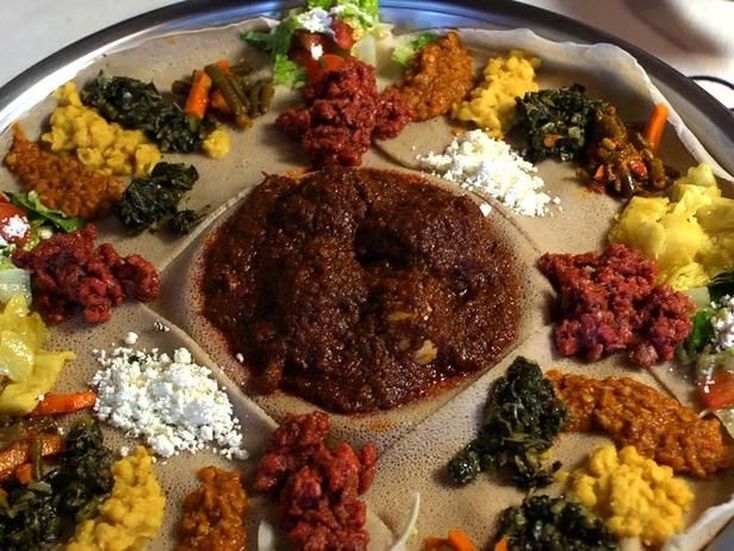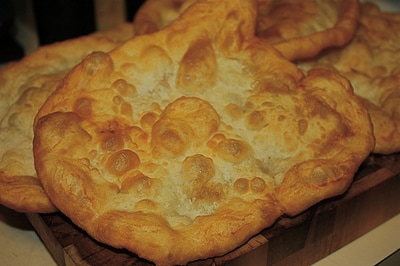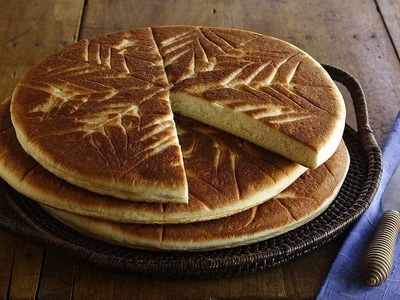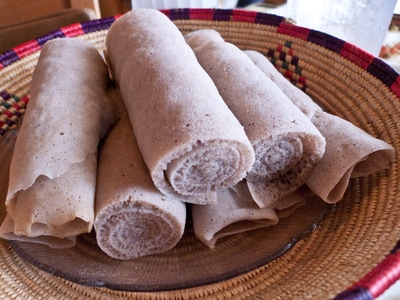Iris, resilient and eloquent, her voice strong and yet incredibly gracious as she tells the story of her Native American people through the fry bread she has brought.
Saba, warm, gentle and kind. Not generally one for the center stage but everyone knows she is the mother hen behind it all -- gathering, nurturing, greeting everyone with a hug or kiss, and informing the other Eritrean moms what dishes they will bring to complete the meal. She holds up the beautiful himbasha she has made especially for this night served in a traditional colored basket. And she talks with pride about the prominence of injera at the center of every Eritrean meal.
And then Efrem. Talented, likeable, smart, with a winning smile and an excitement for life. Nodding his head enthusiastically as Saba describes his own culture and food. Willingly jumping up on stage to play his saxophone and a kirar (which is a stringed guitar-like traditional instrument) as he began to sing a traditional song. The whole room is caught up in the performance and the kids squeal with delight when he offers to let them join him on stage and play along. I’ve said it before and I’ll say it again. It is here at our community meals that I experience just a little taste of heaven.
And so it strikes me. Bread. Communion. The stories of death. The stories of life. The stories of celebration. It is all here. Around the many different colored faces in the room, the varied languages, the rich cultures. We share bread and so we share life. And we share community.
As Saba shared about her beloved injera, it spoke so beautifully of community. The process to make injera takes days, allowing time for the dough to ferment -- just as everything good and beautiful takes time. If you run out, you go get some from your neighbor. Everything about their meal is communal, served on a family-style plate where everyone partakes in this earthy and bodily experience using only their hands. You see, the very nature of the bread tells a story of communion.
In my own faith tradition, we also have a bread of communion, a bread of celebration, and a bread of suffering. We celebrate the Eucharist, remembering a horrific death, the crucifixion of Jesus. And we remember that life comes out of death and that joy comes out of sorrow. That Jesus rose from the grave, conquering death and evil for all time. We celebrate that love wins. That mercy triumphs over judgment and that love conquers evil.
This is what the Easter holiday is all about. And so as we break the bread, we remember the suffering of Jesus and of all humanity. We stand in solidarity with those who suffer the unimaginable -- the Syrian refugee, the child forced to work slave labor, the women and children in South Sudan walking for weeks in search of food. And we remember our suffering God, who entered the pain and the brokenness of our world and who ultimately defeated evil, violence and oppression with LOVE. We remember that God’s presence is here with us. We experience communion. God’s presence is near, and it sustains us. For Jesus said, I am the bread of life. Whoever comes to me will never go hungry. We receive the gift of community. We are not alone. We are all a part of a story of love and redemption that is unfolding.
This week, as we remember the suffering of Christ and the suffering of the world, may we eat the bread of brokenness and join in the suffering of all of humanity. Conversely, as we celebrate the biggest win of all time in the resurrection of our Lord and the day the revolution of love began, may we also share in the bread of celebration and abundant life. And may we break bread together. Often. Regularly. With our neighbors. Across different cultures and different religions, political mindsets, and socio-economic divides. May we find the joy of communion as we share our bread and thus our lives.
by Jessica Ketola




 RSS Feed
RSS Feed
